IEA and OPEC clash over oil & gas sector's green transition ahead of COP28
The International Energy Agency (IEA) argued that oil and gas firms account for only 1% of clean energy investment. OPEC has hit back by accusing the IEA of "unjustly vilifying" the industry.
 PHOTO: (L-R) Russia, Saudi and US flags against oil pump and oil refining factory at night. Getty Images
PHOTO: (L-R) Russia, Saudi and US flags against oil pump and oil refining factory at night. Getty Images
A recent IEA report that assesses the oil and gas sector's green transition has triggered a standoff between the Paris-based energy watchdog and the Organization of the Petroleum Exporting Countries (OPEC) - which represents Middle Eastern and African oil producers.
“Producers must choose between contributing to a deepening climate crisis or becoming part of the solution by embracing the shift to clean energy,” the IEA wrote in a special report last week. The report stated that the oil and gas industries faced a "moment of truth" in their efforts to contribute to the green transition.
“Whose moment of truth?” asked OPEC, calling IEA's perspective an “extremely narrow framing of the challenges” as it “expediently plays down" concerns of energy security, access and affordability.
IEA calls out Middle Eastern oil producers
The IEA recommended the energy sector to divert half of its capital expenditures towards clean energy projects by 2030 to limit global temperature rise to 1.5°C. This will be on top of the investment required to reduce emissions from their own operations, the IEA said.
It further suggested all oil and gas companies, specifically in the Middle East, to come up with individual decarbonisation roadmaps as the sectoral carbon footprint needs to decline by 60% by 2030 to align with the 1.5°C goal.
“The emissions intensity of oil and gas producers with the highest emissions is currently five-to-ten times above those with the lowest, showing the vast potential for improvements,” the IEA noted.
Furthermore, it asserted that industry cannot depend on carbon capture, utilisation and storage (CCUS) to "maintain the status quo", instead of reducing fossil fuel production. According to IEA estimates, limiting global temperature to 1.5 °C would require 32 billion mt of carbon captured for CCUS projects by 2050, including 23 billion mt of direct air capture. This would require more electricity than is currently consumed globally.
“The industry needs to commit to genuinely helping the world meet its energy needs and climate goals – which means letting go of the illusion that implausibly large amounts of carbon capture are the solution,” IEA’s executive director Fatih Birol said.
“The fossil fuel sector must make tough decisions now and their choices will have consequences for decades to come,” Birol warned. “Clean energy progress will continue with or without oil and gas producers. However, the journey to net zero emissions will be more costly, and more challenging to navigate, if the sector is not on board.”
OPEC responds
In response to the IEA's report, OPEC secretary general Haitham Al Ghais commented that “the manner in which the IEA has unfortunately used its social media platforms in recent days to criticise and instruct the oil and gas industry is undiplomatic to say the least. OPEC itself is not an organisation that would prescribe to others what they should do.”
The oil producers’ coalition also claimed that IEA’s net-zero scenario “is a tool intended to curtail the sovereign actions and choices of oil and gas producing developing countries, through pressurizing their National Oil Companies.”
Al Ghais criticised Birol for undermining CCUS' potential and stressed that reducing emissions has now taken precedence over finding the right renewable energy sources.
“Energy security, energy access and energy affordability for all must go hand-in-hand with reducing emissions. This requires major investments in all energies, all technologies, and an understanding of the needs of all people. At OPEC, we repeat that we believe the world has to concentrate on the task of reducing emissions, not choosing energy sources,” he added.
Time to extend an olive branch?
Both sides, however, found some common ground. The IEA reported that oil-producing countries in the Middle East have a strong knowledge base and untapped renewable energy resources. This could establish a firm foothold in low-emission value chains. OPEC acknowledged the need for collaboration between countries and climate advocates to reduce emissions and ensure energy security.
“In a world where more dialogue is needed, we repeat that finger pointing is not a constructive approach,” OPEC said.
The IEA suggested that the oil and gas sector should scale up crucial decarbonisation technologies including hydrogen, carbon capture, offshore wind and liquid biofuels. This is congruent with the OPEC's statement that the industry is "embracing renewables" and investing heavily in technologies such as "CCUS, direct air capture, carbon dioxide removal, and clean hydrogen.”
“We do see a ‘moment of truth’ ahead. We need to understand that all countries have their own orderly energy transition pathways, we need an assurance that all voices are heard, not just a select few, and we need to ensure that energy transitions enable economic growth, enhance social mobility, boost energy access, and reduce emissions at the same time,” Al Ghais concluded.
By Konica Bhatt
Please get in touch with comments or additional info to news@engine.online





